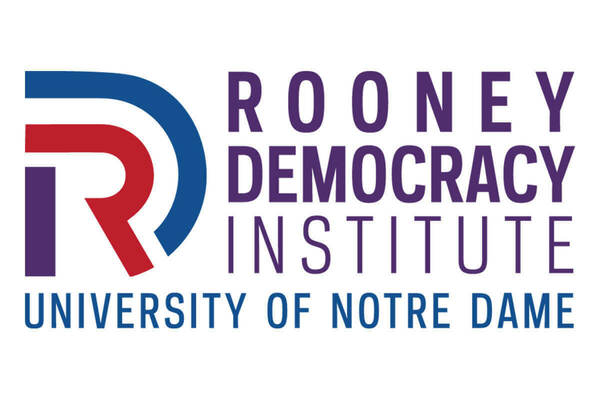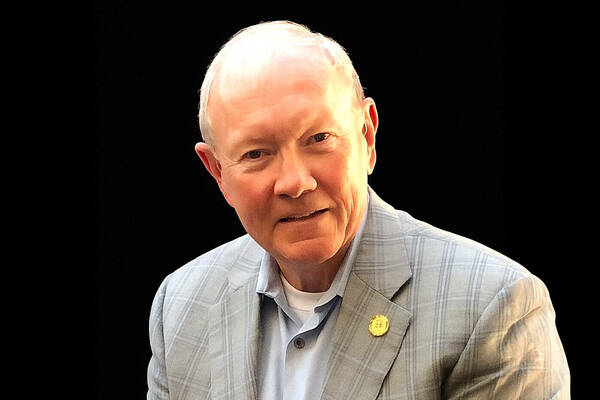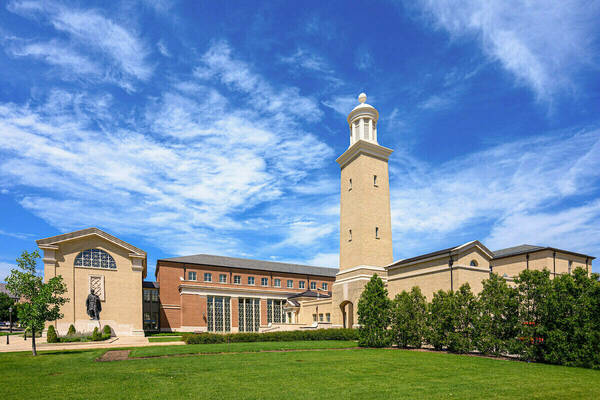Nobel laureate Joseph Stiglitz addresses inequality with a people-centered economy
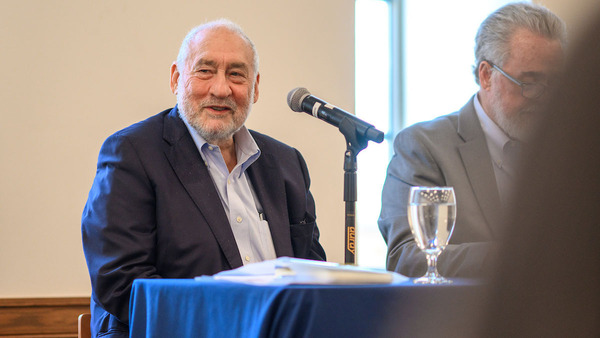
Inequality is a policy choice — not an inevitable outcome — and can be addressed through economic approaches that prioritize human dignity, economist and Nobel laureate Joseph E. Stiglitz said during a recent visit to the University of Notre Dame’s Keough School of Global Affairs.
Stiglitz, a Columbia University professor and former chief economist at the World Bank, met with faculty and students as well as Keough School and Notre Dame leadership during his April 15 visit to campus, during which he delivered the inaugural Joseph E. Stiglitz Lecture on Inequality and the Good Society.
The new lecture series, made possible with support from the Ford Foundation, was organized by Ray Offenheiser, director of the Keough School’s McKenna Center for Human Development and Global Business. The series is dedicated to bringing outstanding scholars to Notre Dame to share groundbreaking scholarship and policy insights on inequality and is a part of larger strategic efforts by the school and the University to address global poverty.
Watch a discussion between Joseph Stiglitz and Ray Offenheiser on global inequality here.
Rules create structural inequality
During his public remarks, Stiglitz outlined the ways inequality is written into the rules of the U.S. and global economies by powerful interests that prioritize profit.
“Markets don’t exist in a vacuum,” Stiglitz said. “We structure our market with rules and regulations. Rules matter for creating inequality. [In the United States], we’ve frankly made a choice to have more inequality than other countries.”
In the United States, some 40 years of neoliberal — or free-market-oriented — economic policies have bolstered corporations and lowered the living standards of everyday people, Stiglitz said. In particular, rules have weakened antitrust protections and permitted monopolies; weakened worker bargaining power, ensuring that wages haven’t kept pace with profits; crafted bankruptcy laws that favor companies while forcing bankrupt consumers to repay student loans; and allowed corporations to pay low taxes while enjoying massive profits.
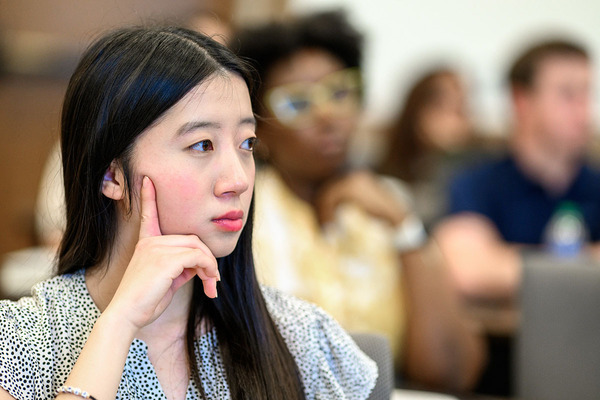
As a result, Stliglitz said, the United States has less economic mobility than peer countries — meaning that for U.S. residents, life outcomes are more dependent on their parents’ income and education levels than they are for people in other wealthy countries.
These regressive policy choices are reinforced by the United States’ political system, Stiglitz said, where Supreme Court decisions like Citizens United have given corporations more power to make political donations and shape the rules in their favor. And inequality remains a problem globally as well, he said: Multinational corporations lobby to keep their tax rates low, and the international debt architecture favors wealthy creditors over cash-strapped countries that slash public spending in order to afford high debt payments.
Ultimately, the inequality created by these systems and structures threatens the future of democracy, Stiglitz said, adding that widespread dissatisfaction leaves voters vulnerable to demagogues who mislead the public and discard democratic norms.
Prioritizing human dignity: Policy and practice
While Stiglitz was unsparing in his critique of the status quo, he also expressed optimism that voters and policymakers could make different choices and reframe how they think about and discuss the concept of freedom. He urged audience members to think of freedom not as fewer government regulations but rather as the opportunity for everyday people to live a good life.
“Freedom should be about human dignity and human flourishing,” Stiglitz said.
Such an approach — one that prioritizes the needs of marginalized people and communities — made Stiglitz a natural fit to inaugurate the Keough School’s new inequality lecture series, said Scott Appleby, the Marilyn Keough Dean of the Keough School.
“Confronting inequality can make us uncomfortable because it may challenge us personally to face some hard facts about our economic system and who it benefits at the expense of others,” Appleby said.
“But such moral and intellectual discomfort may be just the challenge we all need. Indeed, commitment to human dignity and intellectual development challenges us to examine those social structures and systems that explain and sustain the marginalization of the poor, and to pursue policies and practices that would create a more equitable and just world.”
Watch the full lecture here.
Originally published by Josh Stowe at keough.nd.edu on April 22.
Contact: Tracy DeStazio, associate director of media relations, 574-631-9958 or tdestazi@nd.edu
Latest University News
- Notre Dame’s Kellogg Institute partners with Vanderbilt University to launch 2025-26 democracy surveyThe University of Notre Dame’s Kellogg Institute for International Studies and Vanderbilt University’s Center for Global Democracy are partnering to advance one of the world’s leading surveys on attitudes toward democracy. Starting in October, the Center for Global Democracy, with support from the Kellogg Institute, will conduct the 2025-26 round of the AmericasBarometer, which tracks public opinion on democracy in 20 countries across the Americas.
- Francis and Kathleen Rooney make transformative gift for Notre Dame institute focused on democracy research and educationFrancis and Kathleen Rooney of Washington, D.C., and Naples, Florida, have made a gift to the University of Notre Dame to endow an institute in the College of Arts & Letters committed to the preservation of American democracy through research, teaching and public engagement. The Rooney Democracy Institute, formerly known as the Rooney Center for the Study of American Democracy, aims to advance Notre Dame’s role as a national and global leader in democracy scholarship and as a convener of bipartisan conversations about the future of democracy.
- Gen. Martin Dempsey to speak at Notre Dame Forum event on ‘Hope, Global Stability and the Role of the United States’Gen. Martin Dempsey, the retired 18th chairman of the Joint Chiefs of Staff, will join University President Rev. Robert A. Dowd, C.S.C., for a fireside chat at 4 p.m. Friday (Oct. 10), as part of the 2025-26 Notre Dame Forum. The discussion, titled “Hope, Global Stability and the Role of the United States,” is part of the exploration of this year’s Notre Dame Forum theme, “Cultivating Hope.” It will take place in Rooms 215/216 of McKenna Hall and will also be livestreamed. The event is free and open to the public.
- University of Notre Dame joins the Global Coalition of Ukrainian StudiesThe University of Notre Dame has joined the Global Coalition of Ukrainian Studies after signing a memorandum of cooperation, formalized Sept. 24, at the Ukrainian Institute of America in New York City. Notre Dame joined four other American institutions that were also publicly welcomed to the coalition at this event: Arizona State University, Columbia University, Manor College and the Shevchenko Scientific Society.
- Alumni Association and YoungND honor 2025 Domer DozenThe Notre Dame Alumni Association announced its 2025 Domer Dozen cohort, honoring 12 graduates ages 32 and younger for excellence in their contributions in learning, service, faith and work — the core pillars of the association’s mission.
- Notre Dame School of Architecture poised for global leadership through historic investmentThe $150 million gift represents an unprecedented commitment in the 160-year history of American architectural education. In recognition of this landmark gift, the school will be renamed the Matthew and Joyce Walsh School of Architecture at Notre Dame.









